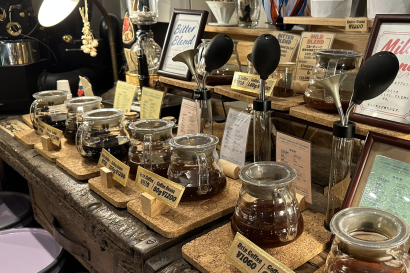To the Girl in the Yellow Hat,
Do you remember walking through a foreign worker’s rights demonstration in Tokyo? It was in Minato-ku, near a waterway. The sun was merciless that day, but gusts of wind brought temporary relief from the heat. Dozens of red banners fluttered with the breeze, carried by men and women who were reciting loud speeches, raising their fists to the sky, and expressing their rage through dance. Among all the excitement, you were there, wearing the wide-brimmed yellow hat of a kindergartener. You were the tallest out of a trio of schoolgirls, trying to find your way home through all the commotion of the protest. At one moment, you stopped and slowly swung your head around at the people around you. Taking in the energy around you, you shouted “Sugoi!” (Amazing!)
What was it about the protest that impressed you? Perhaps the colorful banners? Maybe it was the spectacle of it all, livening up your usual commute home? Or was it was a spark of inspiration, a feeling in the back of your mind that these people were fighting the good fight?
Perhaps that last one is a bit much for someone so young. To be honest, with my (lack of) Japanese skills, I probably understood some of those speeches just as well as a kindergartener would. I looked the part of a protester, wearing a red armband and holding a matching banner given to me by the labor unionists I intern for each Wednesday. But I felt out of place as a well-off American student, demonstrating with foreign workers that live extremely difficult lives here in Japan. Despite all that, I was playing connect-the-dots in my mind, trying to piece familiar words together into something greater. Words like chingin (wages) and sabetsu (discrimination) were all part of a puzzle that I, as an outsider to Japan, was only beginning to understand.
When I was a kindergartener, I liked to solve puzzles. I remember September 11, 2001, when every television channel and newspaper showed planes crashing into the Twin Towers. My parents tried to hide the terror of it all away from me, but I was a troublesome little kid journalist then. I snuck glances at the news, made models of the attack with my toys, and even copied the headlines I saw on pieces of paper, writing my own “newspapers.” My parents were exasperated, because they thought I was far too young. Myself, I just wanted to know the truth.
Maybe you are like I was back then, a kindergarten student with a fire in their heart, wanting to understand the world and make it better. If that is the case, I think that would be more sugoi than anything else. But if your path is anything like mine, there will be some hard truths to swallow. I’d like to tell you about a few of them now, so that perhaps you will be better prepared to meet them with compassion and strength than I was.
One unfortunate truth is that you don’t have to look hard to see hatred in action: it will find you while you are trying to simply live your life. No matter what age, students can be merciless, and stamp down upon any deviance from social norms. You may see classmates be victims of ijime (bullying): perhaps because they are too shy, because they have Korean blood, or because they do not fit the gender norms they are assigned. It’s a similar story in America: classmates mocked me because I prefered to hang out with girls and liked shoujo manga more than a traditionally masculine person should. They called me “lady” or “gay,” because ignorant people believe those words are insults.
I learned at the demonstration that in Japan, some adults do not outgrow the urge to stamp down on those who are different. One worker from Vietnam, about my age, told the crowd about his experience as a foreign worker in Japan. He worked obscenely long hours, for little pay, all while his Japanese superiors had countless names for him, like “baka” (idiot) or “gaijin,” (foreigner). They’d sometimes tell him he was “useless,” and that he should “go die.”
It is an unfortunate reality, but it’s always possible to fight back. It is within any person’s capability to stand up for others, and listen to those who are hurt by society’s blind hatred. As for myself, it was being the target of hatred that drove me to strive to be a kind and understanding person. To learn more a to build a better world where others do not have to share that experience with me.
If you grow up to have the same dream, your endeavor will shine a light into the darkest parts of society. Someday, you’ll watch the news or pick up some hearsay on the train. You’ll hear stories like “Far-right nationalists march through Shin-Okubo, threatening Korean residents,” “Female Tokyo Lawmaker subject to sexist abuse from colleagues,” or “Majority of LGBT Students in Japan experience bullying, contemplate suicide.” Someday, these seemingly distant stories will hit too close to home. I remember learning for the first time that unlike myself, many of my friends feared the police, for no other reason but their skin color. I remember learning that my female friends got nervous when I spoke loudly or angrily: not because of me necessarily, but because bad experiences with aggressive, angry men are very common among women.
I had that familiar feeling again, when one worker at the demonstration gave a speech in English, because he struggled with Japanese. He was Filipino, just like me. He was also around my age. Fighting back tears, he shouted, “Why are we treated like this? We just want to work hard and support our families... When Japanese people come to our country we treat them with respect. So why do the Japanese refuse to do the same for us?” Perhaps if history were only slightly different, that man would have been me, and he would have been the Filipino-American student, capable of doing nothing but listening and trying to learn.
There are so many different paths to follow for someone so young, and I hope that the one you follow is one with experiences like these: experiences that build empathy, compassion, and a conviction to fight the bitter realities of life. Perhaps you’ll have them while you are wearing that yellow hat. Maybe a high school uniform, or a college sweatshirt. Or maybe even a business suit as you settle into adulthood. Everyone goes through life at a different pace. I just hope that you’ll find that fire in your heart: the one that will change the world.

Timothy Valero
<p>Timothy is a third-year East Asian Studies/Diplomacy and World Affairs double major from Occidental College in Los Angeles. Prior to studying abroad, Timothy’s studies have centered on historical and contemporary East Asian and Asian American experiences. He further focuses on social movements and minority rights, and is Vice President of Asian Pacific Americans for Liberation, a cultural/political student organization at his home college. He will be spending his time in Tokyo learning about Japan’s unique history and culture, visiting cat cafes, working hard to improve his Japanese language skills, petting cats, eating as much curry rice as possible, and purchasing cute cat-related items.</p>





